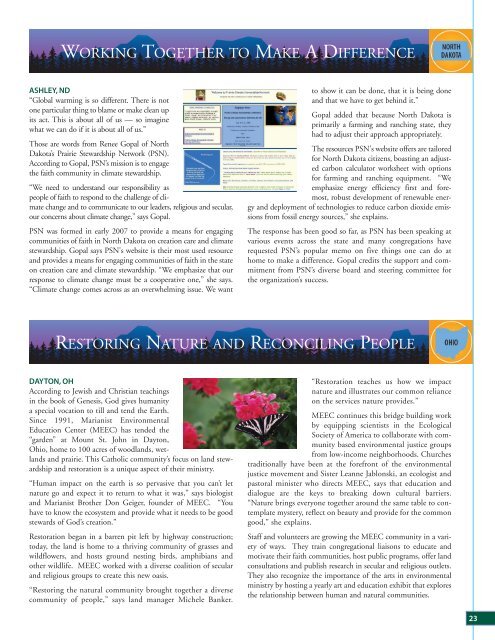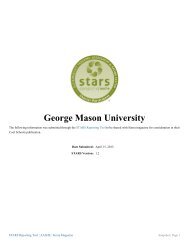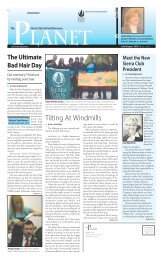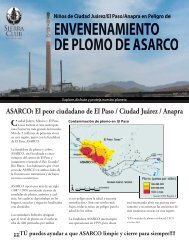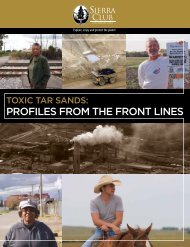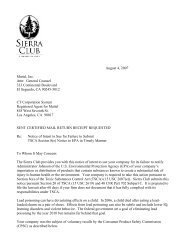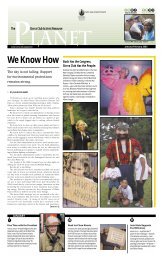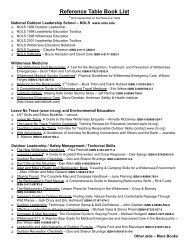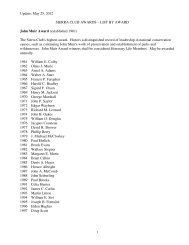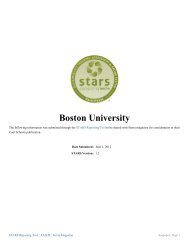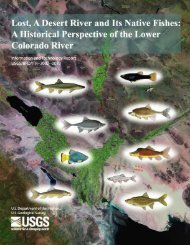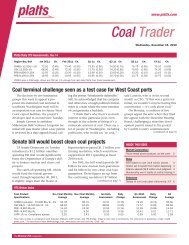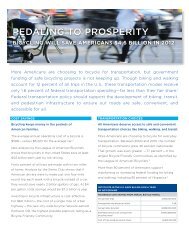FAITH IN ACTION - Sierra Club
FAITH IN ACTION - Sierra Club
FAITH IN ACTION - Sierra Club
Create successful ePaper yourself
Turn your PDF publications into a flip-book with our unique Google optimized e-Paper software.
WORK<strong>IN</strong>G TOGETHER TO MAKE A DIFFERENCE<br />
ASHLEY, ND<br />
“Global warming is so different. There is not<br />
one particular thing to blame or make clean up<br />
its act. This is about all of us — so imagine<br />
what we can do if it is about all of us.”<br />
Those are words from Renee Gopal of North<br />
Dakota’s Prairie Stewardship Network (PSN).<br />
According to Gopal, PSN’s mission is to engage<br />
the faith community in climate stewardship.<br />
“We need to understand our responsibility as<br />
people of faith to respond to the challenge of climate<br />
change and to communicate to our leaders, religious and secular,<br />
our concerns about climate change,” says Gopal.<br />
PSN was formed in early 2007 to provide a means for engaging<br />
communities of faith in North Dakota on creation care and climate<br />
stewardship. Gopal says PSN's website is their most used resource<br />
and provides a means for engaging communities of faith in the state<br />
on creation care and climate stewardship. “We emphasize that our<br />
response to climate change must be a cooperative one,” she says.<br />
“Climate change comes across as an overwhelming issue. We want<br />
RESTOR<strong>IN</strong>G NATURE AND RECONCIL<strong>IN</strong>G PEOPLE<br />
DAYTON, OH<br />
According to Jewish and Christian teachings<br />
in the book of Genesis, God gives humanity<br />
a special vocation to till and tend the Earth.<br />
Since 1991, Marianist Environmental<br />
Education Center (MEEC) has tended the<br />
“garden” at Mount St. John in Dayton,<br />
Ohio, home to 100 acres of woodlands, wetlands<br />
and prairie. This Catholic community’s focus on land stewardship<br />
and restoration is a unique aspect of their ministry.<br />
“Human impact on the earth is so pervasive that you can’t let<br />
nature go and expect it to return to what it was,” says biologist<br />
and Marianist Brother Don Geiger, founder of MEEC. “You<br />
have to know the ecosystem and provide what it needs to be good<br />
stewards of God’s creation.”<br />
Restoration began in a barren pit left by highway construction;<br />
today, the land is home to a thriving community of grasses and<br />
wildflowers, and hosts ground nesting birds, amphibians and<br />
other wildlife. MEEC worked with a diverse coalition of secular<br />
and religious groups to create this new oasis.<br />
“Restoring the natural community brought together a diverse<br />
community of people,” says land manager Michele Banker.<br />
to show it can be done, that it is being done<br />
and that we have to get behind it.”<br />
Gopal added that because North Dakota is<br />
primarily a farming and ranching state, they<br />
had to adjust their approach appropriately.<br />
The resources PSN's website offers are tailored<br />
for North Dakota citizens, boasting an adjusted<br />
carbon calculator worksheet with options<br />
for farming and ranching equipment. “We<br />
emphasize energy efficiency first and foremost,<br />
robust development of renewable energy<br />
and deployment of technologies to reduce carbon dioxide emissions<br />
from fossil energy sources,” she explains.<br />
The response has been good so far, as PSN has been speaking at<br />
various events across the state and many congregations have<br />
requested PSN’s popular memo on five things one can do at<br />
home to make a difference. Gopal credits the support and commitment<br />
from PSN’s diverse board and steering committee for<br />
the organization’s success.<br />
“Restoration teaches us how we impact<br />
nature and illustrates our common reliance<br />
on the services nature provides.”<br />
MEEC continues this bridge building work<br />
by equipping scientists in the Ecological<br />
Society of America to collaborate with community<br />
based environmental justice groups<br />
from low-income neighborhoods. Churches<br />
traditionally have been at the forefront of the environmental<br />
justice movement and Sister Leanne Jablonski, an ecologist and<br />
pastoral minister who directs MEEC, says that education and<br />
dialogue are the keys to breaking down cultural barriers.<br />
“Nature brings everyone together around the same table to contemplate<br />
mystery, reflect on beauty and provide for the common<br />
good,” she explains.<br />
Staff and volunteers are growing the MEEC community in a variety<br />
of ways. They train congregational liaisons to educate and<br />
motivate their faith communities, host public programs, offer land<br />
consultations and publish research in secular and religious outlets.<br />
They also recognize the importance of the arts in environmental<br />
ministry by hosting a yearly art and education exhibit that explores<br />
the relationship between human and natural communities.<br />
23


